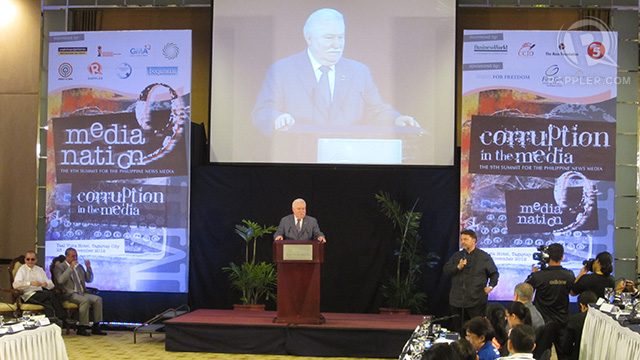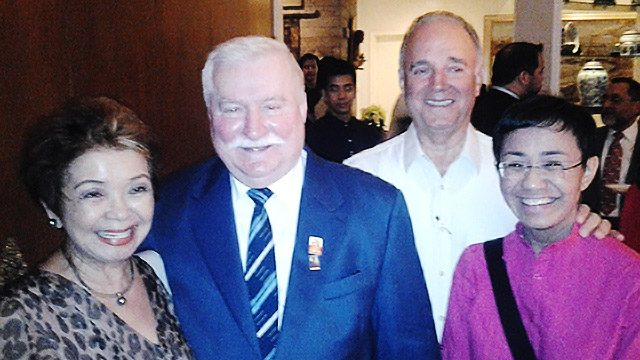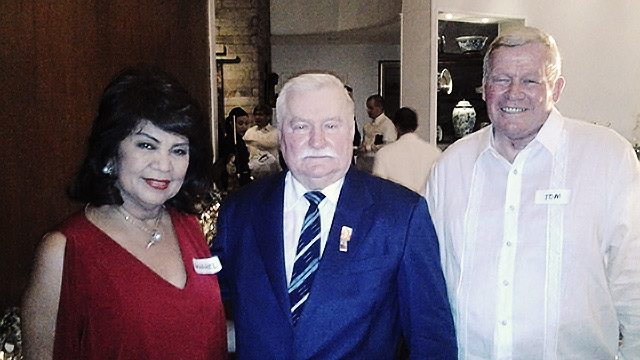SUMMARY
This is AI generated summarization, which may have errors. For context, always refer to the full article.

MANILA, Philippines – He shakes my hand, hands his tablet to his aide, and asks him to take a photo. He takes the tablet back, taps the screen a few times and smiles. Then he shows us an iPad on the table next to him with a link to his blog, and there is our picture, live! 
“If I had today’s technology, I could’ve launched 10 revolutions,” says 69-year-old Nobel laureate Lech Walesa, an electrician and trade-union activist, who with little formal education, led one of the most profound freedom movements of the 20th century. The Solidarity Movement in Poland served as an inspiration for student leaders in the Philippines fighting against nearly two decades of Ferdinand Marcos’ rule. That helped set the stage for the 1986 People Power revolt.
Walesa became president of Poland, established democratic reforms, pushed the Soviet Union out of his homeland, and moved his country towards a free-market economy. Now he’s questioning the very systems he once helped put in place.
“Those revolutions I took part in for free economy led to this future,” Walesa says. Now he predicts more revolutions to come, echoing statements he gave a few hours earlier at the close of Media Nation, an annual gathering of journalists and media executives. This year, the focus was media corruption, something Walesa said must not be tolerated.
“Media has the most important role in the world today,” he told Filipino journalists in Tagaytay. “You can build with freedom. You can also destroy with freedom.” He challenged his listeners, asking them not to miss a global movement that is happening now.
“We are before the big era of the next revolutions,” Walesa said. “Our next generation will not allow injustice to happen. We have to correct the systems.”
Walesa mentioned the Arab spring, the euro crisis, the US subprime crisis and alluded to last year’s Occupy Wall Street protests, events which started in one place and spread globally. He said these events show “the three great questions” that must be asked, and journalists should lead the way – challenging existing views about the economy, politics and values.
Several hours later, I’m sitting next to Walesa at an intimate dinner in the home of Tom and Annabel Wisniewski, founder of Raintree Partners. While guests are getting food, we sit at a corner of the table, and he elaborates further: “Most protests today are against capitalism, democracy and dishonesty.” 
People don’t want cheaters. They need jobs. He throws out phrases. These systems are no longer working, and they are all connected. The world is broken, and it must be fixed. He talks about values which influence both the political and economic systems globally. “If we find those values – values that come from religion, from your Faith – then all the rest is simple.”
His eyes twinkle, and he waves his arms around in the air. He speaks through an interpreter, Jozef Sarach. Walesa is charismatic and engaging – even when he’s listening. His white mustache and silver hair, his stocky build against the Christmas decorations in the Wisniewski home juxtapose conflicting images in my head. I smile. He reminds me of Santa Claus – except this Santa is preaching revolution.
Internet and revolutions
He interrupts Jozef and waves his fork at me, saying the Internet is fuel for the revolution. “People are starting to organize themselves through the Internet,” he says. “That’s why I appeal to journalists like you. You must ask these questions. You have to provoke a discussion. The world has never been as dependent on media as it is today.”
We hear the clinking of glasses. Guests gather around the table. Sen. Ed Angara comes up and sits on his right side. Walesa stands up to speak. He apologizes because he says he has to leave soon.
He looks at the guests around the table and speaks to them.
“You belong to the elite of this country, and the future depends on you. Everything is connected. What happened in Poland affects you here, and what you do here affects us.” We were all listening.
“You have the chance to have peace, development and wealth. This is our chance right now. We have to turn the shanties into beautiful houses. I’m asking you – we have to use this chance given to us. Many are saying it’s not possible. They said the same thing when I was fighting the Communists. Through values and solidarity, we can do it.”
I thought about Walesa’s career: a man who fought Communism and a superpower and won; a man who held and lost power; a man who now sits on the outskirts of power in his country.
He chides his Filipino audience. “If we can have as beautiful a country as the Philippines, the US would not be a superpower!” Everyone laughs. “God gave you too much. You have grown lazy.”
Annabel, the hostess of the evening, asks Sen. Angara to respond. He gives Walesa a book about the galleon trade and gives more details about the Philippines. “Today, we are seeing a return to the Philippines of the global trade,” he says.
Walesa retorts, “And on top of it you have beautiful girls!” Everyone laughs again.
Before Walesa leaves, he threatens the people in the room. “I will come back to see what you’ve done. If you haven’t done anything, I will start Solidarity in the Philippines!”
On his way out the door, he takes his tablet and takes a few more photos for his blog. The democracy icon of the 1980’s is embracing the virtual world and warns about “the new era coming – of intellect, information and globalization.”- Rappler.com
Add a comment
How does this make you feel?
There are no comments yet. Add your comment to start the conversation.